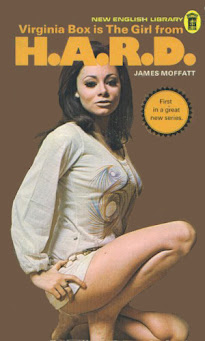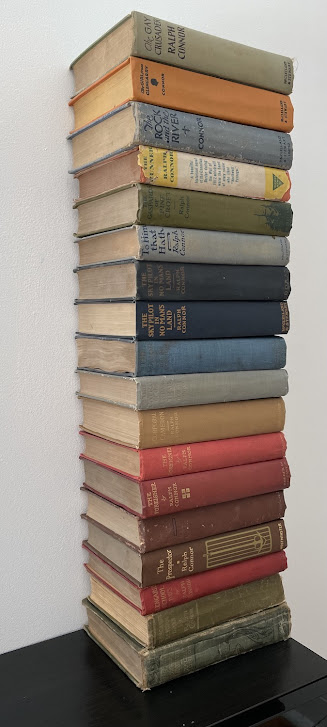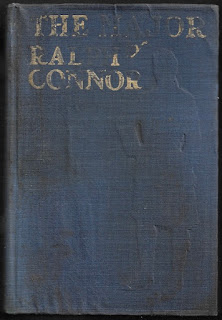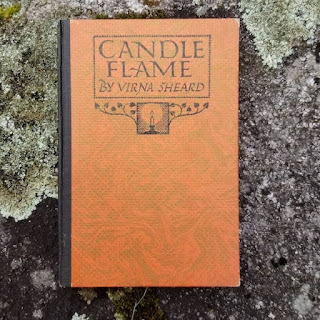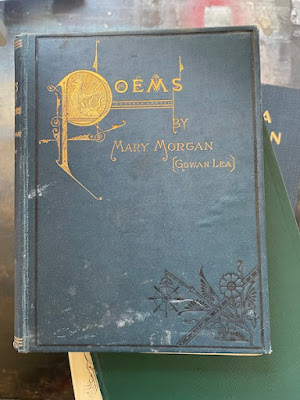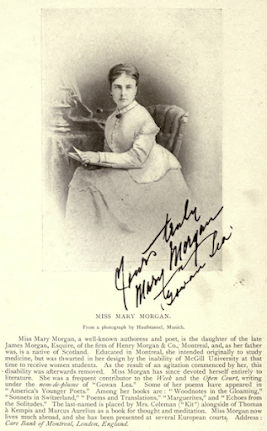For the month, the sixth of ten poems
I find interesting, amusing, and/or infuriating.
Unconventional Easter verse, eight decades old this year, by son of Staffordville, Ontario Harold Campbell Mason (1895-1976). The poet served as gunner in the First World War, surviving a leg wound that took him out of the fighting two months before the Armistice. After his return to Canada, he studied at the Ontario Agriculture College, turned to dairy farming, served as farming editor for the London Advertiser, and worked on adverts for Purina.
Mason wrote two books, the first, Bits o' Brass (Toronto: Thomas Allen, c.1921), being a collection of short stories and verse inspired largely by the war in which he'd fought. His second and last book, Three Things Only... (Toronto: Thomas Nelson, 1953) collects verse from the first, adding others, some of which were inspired by the Second World War.
This is one.
Mason's enlistment papers record his religion as Methodist.
EASTER, 1942
Ring out, O happy Easter bells
For Christ is risen, is risen indeed!
Proclaim to priest and people from every chiming steeple
That Christ is risen, is risen indeed!
Let your clamor, let your clanger, let your chime
Beating time
Praise the Lord!
Praise the risen Victor-Victim by all the saints adored.
Praise the Lord!
For Christ is risen, is risen, is risen
For Christ is risen, is risen indeed
For Christ the Lord is risen, is risen indeed!
Young Jimmy Geantley, fresh-faced fighter pilot,
Just ten months out of college
Still grilled by his commission,
His uniform and badges,
His cunning and his courage,
The thunder of his engine and the power of his guns,
Sees the tracers smoking past him,
Dives her,
Spins her,
Sees the blue and orange flame-spout
Spurt across the dizzy cockpit,
Tries to beat the horror down with bare hands,
Burned and helpless hopeless hands,
While he plummets flaring, flaming
To the earth.
There's a girl in far Toronto who will never know her mate
But such is human nature, such is fate.
Every Sunday, through the years,
Through a haze of prideful tears
She will see his name enshrined
"To the glory of our God and in loving memory"
While the boy fades out of mind
And legend grows instead,
Warrior-hero, warrior-dead,
Happy hero, happy dead,
Smiling hero, dead to save us
In the war.
Ring out, O happy Easter bells
For Christ is risen, is risen indeed!
He is risen, He is risen, He escapes this earthly prison,
He prepares us many mansions
For believers
In the skies!
"Ah lovely and blue is the sky above Naples
And lovely and blue is the sea,
And lovely and blue are the eyes of Giana
The bright one, the fair one, from fair Lombardy!"
So humming to comfort him, heartsick and lonely
To bolster his courage, alone in the night,
Antonio Rillio hears not the rustle, the only
Faint warning of peril, of heart-clutching fright-
Of the rush, of the yell, of the knives, and the Night.
Ring out, O happy Easter bells
For Christ is risen, is risen indeed!
Proclaim to every nation glad tidings of salvation
For Christ the Lord is risen, is risen, is risen, is risen,
For Christ the Lord is risen, is risen indeed!
Soldier Ivan Volushenko hangs groaning on the wire.
Hangs tangled in the wire,
Holding hard his belly where the Fascist bullet got him
As if almost he hoped to stop that steady bleeding, that inward fatal bleeding,
But he knows—
He knows the thing will kill him
Here so far from far Kazan.
Little Ivan, and Katushka, and the others,
They will never know their father,
They will think of him as a hero, not as a man,
They will tell the tale with pride,
How he fought and how he died,
How he died to save his comrades
In the war.
Ring out, O happy Easter bells—
Intone, O priest, and chant, O choir!
Let your voices, soaring higher,
Join a tale of jubilation, tell the story of salvation,
Spread the story far and wide
How the Victor-Victim died,
How he died and how he rose
With a mighty, mighty triumph o'er his foes,
O'er his foes—
Alleluia, praise the Lord,
For Christ the Lord is risen, is risen indeed!
Little Gretchen Kinderkin lies dying in the rubble,
Lies dying in the rubbish where the British bomb exploded,
Twisted, torn, and flung to die
Pinned beneath the bone brickwork.
She is lucky, she is dying
Free from pain and freeform terror
After that first shrieking instant,
That brief shrieking instant,
Not again too hear the bombers, not again to bear the bombings,
Not again to shrink and shiver
And hear the children cry.
She is dying,
Luckier far than brother Hansel whom she sheltered as they fell
In the centre of the howling and the thunder-blast of hell—
He must live out his life with his arm torn off.
They will tell him, when he's older,
How his sister sought to save him,
How his sister died to save him
In the war.
Ring out, O Easter bells, ring out,
For Christ is risen, is risen indeed,
And Mrs. John Jones has a new spring hat.
Let your calmer, let your clanger, let your chime
Beating time
Praise the Lord!
Doesn't Mrs. Smith look ghastly in that ghastly green creation,
I wonder what it is he sees in her?
Do you think the tartan tie is really regulation,
And the collar of that tunic—do you think it's really fur?
Proclaim to every nation glad tidings of salvation,
Tell a tale of jubilation
To the booming and clanging of the bells—
Praise the Lord,
For Christ is risen, is risen indeed!
For Christ is risen, is risen indeed?
Ah no. He hangs upon his cross
Bewildered by defeat and loss—
Worshipped. A god. A thing apart.
The nails still tearing at his tortured hands,
The doubt still tearing at his tortured heart.
Related posts:


